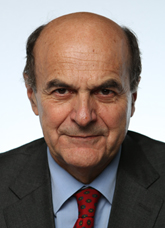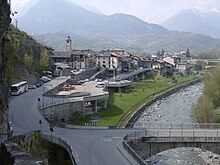
Italy of Values is a populist and anti-corruption political party in Italy. The party was founded in 1998 by former Mani pulite prosecutor Antonio Di Pietro, who entered politics in 1996 and finally left the party in 2014. IdV has aimed at gathering and giving voice to different sectors of the Italian society. From the beginning of its existence one of its major issues has been the so-called "moral issue". In the early 2010s, IdV was eclipsed by the new-born Five Star Movement, founded by comedian Beppe Grillo, which used the same populist and anti-corruption rhetoric.

The People of Freedom was a centre-right political party in Italy. The PdL launched by Silvio Berlusconi as an electoral list, including Forza Italia and National Alliance, on 27 February for the 2008 Italian general election. The list was later transformed into a party during a party congress on 27–29 March 2009. The party's leading members included Angelino Alfano, Renato Schifani, Renato Brunetta, Roberto Formigoni, Maurizio Sacconi, Maurizio Gasparri, Mariastella Gelmini, Antonio Martino, Giancarlo Galan, Maurizio Lupi, Gaetano Quagliariello, Daniela Santanchè, Sandro Bondi, and Raffaele Fitto.
Wolfgang Abel and Marco Furlan are a German-Italian serial killer duo who were arrested for a series of murders in Italy, the Netherlands and Germany between 1977 and 1984. They claimed innocence, saying they were scapegoats for a police force that could not find the real criminals.
Donato Bilancia was an Italian serial killer who murdered seventeen people – nine women and eight men – on the Italian Riviera in the period from October 1997 to April 1998.
Magdalena Solís, known as The High Priestess of Blood, allegedly was a Mexican serial killer and cult leader responsible for orchestrating several murders which involved the drinking of the victims' blood. The murders were committed in Yerbabuena, Tamaulipas, during the early 1960s.

The 2009 Democratic Party leadership election was held in July–November 2009, following the resignation of Walter Veltroni in February 2009, after 16 months as secretary of the Democratic Party (PD), a political party in Italy.

The Apulian regional election of 2010 took place in Apulia, Italy, on 28–29 March 2010.
Necrophilia is a pathological fascination with dead bodies, which often takes the form of a desire to engage with them in sexual activities, such as intercourse. Though prohibited by the laws of many countries, there have been many reported cases of necrophilia throughout history.

Sweets from a Stranger is a 1987 Italian thriller film directed and co-written by Franco Ferrini. The film is about a serial killer targeting sex workers. The women decided to band together to protect themselves, but their efforts are only partially successful as the killer continues their killing spree. As the police investigate, the sex workers group together to try and find some leads on their own.
Giovanni Ferrero is an Italian writer and businessman. He assumed the leadership of the confectionery company Ferrero SpA after the death of his brother Pietro Ferrero in 2011. His personal fortune is estimated at $43.8 billion in 2024 according to Forbes, making him the 26th richest in the world, and richest person in Italy.
Ferdinand Gamper, known as The Monster of Merano, was a serial killer in South Tyrol, Italy. He killed six people in Merano during 1996, before he died.
Luigi Chiatti is an Italian murderer, named "The Monster of Foligno" by the media.
Gianfranco Stevanin, known as The Monster of Terrazzo, is an Italian criminal and serial killer, convicted of murdering six women between 1993 and 1994. His case had great prominence in the national media and raised a debate on the question of the incapability of criminals to understand the consequences of their acts.
Roneys Fon Firmino Gomes, known as the Tower Maniac, is a Brazilian serial killer who, after killing his victims, left their bodies underneath high-voltage electrical towers.
Matej Čurko, known as The Slovak Cannibal, was a Slovak murderer, cannibal and suspected serial killer. He was killed by police after attempting to entice a Swiss man to his death. Upon investigation, it was discovered that he had killed and eaten two suicidal women who had volunteered themselves to be murdered. Soon afterwards, police from Italy announced that the killer could be responsible for the disappearance of an italian woman in the age range from 25 to 28 years.

Maurizio Giugliano, known as The Wolf of Ager Romanus, was an Italian serial killer who killed between two and seven women in Rome and the surrounding area from 1983 to 1984. He later murdered a fellow inmate at a mental hospital in 1993. For these crimes, he was sentenced to life imprisonment and remained imprisoned until his death in 1994.
The Circeo massacre was a rape and murder case that occurred in the Italian town of San Felice Circeo, in the Province of Latina in the Lazio region, between September 29 and 30, 1975. The case involved three men who kidnapped and raped two young women, one of whom died.
Patrick Joseph Max Schaff, known as The House of Horrors Killer, was a French serial killer who murdered and dismembered two homeless women in Italy's Piedmont region in 1995. Convicted of one murder and sentenced to 26 years imprisonment, he killed a cellmate in 2005 and was interned at a psychiatric facility.

Andrea Arrigoni was an Italian serial killer and former private investigator who killed at least two prostitutes and two carabinieri in two separate incidents from 2004 to 2005. He was killed in a firefight with police, and was posthumously linked to his first known murder.
Giancarlo Giudice, known as The Monster of Turin, is an Italian serial killer who murdered nine prostitutes in Turin from 1983 to 1986. Convicted and sentenced to 30 years imprisonment for the crimes, he was released in 2008 and has lived as a free man ever since.








